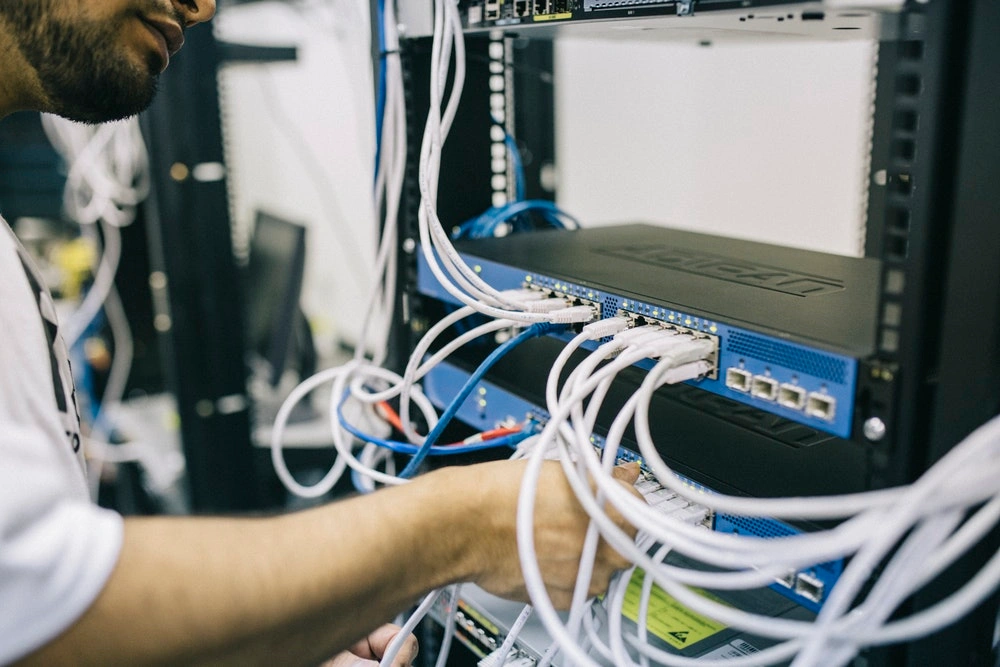Modems, Routers And Access Points - How Are They Different?
Internet devices can at times get a little confusing. Routers, modems, access points - are they actually different? How do they work together? Do I need all of them in my network? Don't worry - we're here to clarify all of this.
Firstly, let's jump into the basics - yes, they are different, and very much so. At the beginning, we should focus on where does the internet access come from.

Your ISP
Anyone can expect to simply plug an ethernet cord into a phone socket and connect to the internet. That's not going to be the case. First, you need to purchase a subscription from an ISP - or an Internet Service Provider. In order to deliver it, they mostly utilize either telephone lines (yes, internet access can run through phone lines), or their own connection, such as optic fibres.
However, you can't simply connect a cable and drag it to your PC - that won't do the trick. You need a device which will be able to encode and decode data that runs from the ISP - otherwise, how would they know whether someone is actually using the service and paying for it? Well, here comes the modem.
Modems
Modems are just that: devices, usually provided directly by your ISP (usually either for free, or by a lease included in your service fee), that allow you to connect to them in order to receive internet access.
So, once you have one plugged in, you're good to go, right? Well... that depends. Most of the time, you are. Technically, a modem itself is not enough to connect your whole home network, even though they oftentimes have ethernet ports that you can connect to via a cable. 99% of the time you are going to be connecting more than one device to the internet - your smartphone, your laptop, PC, TV set... the list goes on and on. The traffic from these appliances needs to be somehow separated and directed. That's where routers come into play.
Routers
Am I good to go now?
Don't get me wrong - more often than not, at this point you will be ready to access the internet, since ISP modems typically have a basic router built-in (although their quality is dubious at the very least). A better solution would be to purchase a decent, separate router, and connect it by cable to your modem. Since routers can be wired, wireless or both, you should make sure that the one you purchase suits your needs - otherwise you might get stuck with some of your devices. Not every router can be accessed by WiFi, for example.
Once you have a router set up, you will be able to connect your personal devices to it. They will be sending and receiving signals that will be directed (or, well, routed) through it. Now you are really set up and ready to go.
Does it matter what router I buy? What do they affect?
Routers are extremely important pieces of infrastructure. We could go as far as to say that they are the most important ones on this list. Your router determines what internet speed you will be able to handle (although what speed you will actually receive depends on your deal with the ISP) - if its maximum capacity is 300Mb/s, then even if your plan is 500Mb/s, you will only be getting up to 300Mb/s.
Routers can also be configured in many different ways. The more advanced the device, the more options it will likely have. Basic ISP-included routers might even lack the possibility to limit internet speed on particular home devices.
What about WiFi?
If your router has wireless capabilities, then a few more factors will come into play, such as the number of wireless connections before it becomes unstable, or simply your WiFi range.
If you have a smaller home, office space or a cafe, then you might not need any more devices. However, larger venues such as hotels, large houses or shopping malls will almost certainly require you to extend the range of your WiFi. That's what Access Points (or simply APs) are for.
Access Points
Access Points are typically attached to the routers, but might also be connected to the modem (although it is advised to connect any devices to the former). It generates WiFi signal you can connect to, which then runs through your router and modem to finally reach the internet.
While certain routers can act as APs after some changes to their settings, an AP will not and should never try to substitute a router or a modem.
So are there all-in-one devices?
Short answer: yes. Proper answer: yes, but using them is not recommended unless you don't require anything but most basic functions.
Many ISPs will provide you with an all-in-one solution: a modem with a built-in router and WiFi capability. Since it does many things simultaneously, it rarely does either of them well.
Not only are they notoriously less configurable and provide less utility than a normal "modem-wireless router" or "modem-router-wireless access point" solution, they are also more difficult to situate in your venue. Most likely you will be required to connect it to a phone socket somewhere in the corner of your room, which is the worst place to set it up in, if you want the signal to reach everywhere.
It is always better to determine what devices you need, then figure out what a proper router will be, and then purchase one and connect everything as it should be.